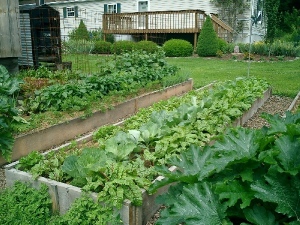
|
 July 16, 2008 July 16, 2008 
Garden Anxiety.
In my last column, I suggested you start planning for the fall garden. Some of you might really be up for this suggestion. Yet, I kind of intuitively knew that not everything was in order for everyone to just willy-nilly plan what's next, given the vagaries of weather, temperature and economy. Mea culpa. I know it's less than a perfect world.
|
You might be preoccupied with asking yourself, "What is going on with my vegetable garden?", "I can't be doing everything wrong. I know there are insect problems and diseases out there, but really! I pay pretty close attention and I just don't get it."
Relax a little, and consider that everything that looks like common vegetable problems may just not be you fault at all. Many may even self-correct themselves.
If there is one thing we cannot control in the vegetable garden, it is the temperature, and frequently it is just this that causes some problems. Some examples are in order so don't blame yourself for what might be Mother Nature's doings.
|
Raised beds - backyard garden in early July.

“Back yard garden.”
|
If you have blossom drop or lack of fruit set on tomatoes, peppers and eggplants, a common cause is less than ideal night temperature (60 degrees to 70 degrees F). Be patient. Nights cooler or warmer than this range often result in no fruit. Where we live, we need to remember anything is possible. Conditions will improve.
Are your lettuce and spinach plants going to seed? Warm temperatures and long days fulfill these requirements. Plants switch from vegetative to reproductive mode in a heartbeat, especially if it's hot and muggy. Plant earlier in the season or later, consider planting in cooler, shadier spots, and look into slow-to-bolt varieties.
Most of us think of snap beans as fool proof, right? When daytime temperatures exceed 90 degrees F, flowers won't develop. Setting will resume when temps drop a bit.
If your first tomatoes are misshapen or contorted, chances are the fruit set was poor and then exposed to cool night temperatures (below 55 degrees F). Have heart. This "cat-facing", as it is called, doesn't usually occur later in the season when the nights get warmer. Right now, it's anybody's guess as to what night temps will be.

There are other problems we might have growing vegetables. A couple of hints in areas where we might have control:
Avoid wide fluctuations in soil moisture. Drought and heavy rains can cause blossom end rot in tomatoes and peppers, but proper irrigation, fertilizing and mulching can help reduce this. Even moisture, supplied by you if necessary, can alleviate a lot of problems. I've had to supply plenty of moisture for the past several weeks.
If you grow sweet corn and the ears show poor kernel development, it might mean you're getting poor pollination. Don't plant sweet corn in a long single row; plant in blocks of several short rows. Corn is a heavy feeder requiring lots of nitrogen.
A final look back at one last phenomenon over which we have no control: Cucurbits, a.k.a. cucumber, squash, pumpkin, muskmelon, watermelon, cantaloupe etc., all need male and female flowers present at the same time in warm enough temperatures, in dry weather, that bees will be pollinating. We know there is a shortage of honeybees. Other pollinators are out there. Be patient. It will usually happen.

As a referential point, let me inform you that rare events occur, some that are most damaging to the garden. On Monday, June 16th, around mid-day, Sundown received a brief hailstorm, pea sized for about five minutes. I surveyed everything and could find no damage even to broadleaf plants like rhubarb and my redbud tree. Wednesday morning, I went to my other job in Claryville. Here I learned that this other valley in the Town of Denning received golf-ball to pool-ball sized hail for a sustained twenty minutes. It decimated gardens along the valley, caused several thousands of dollars of damage to vehicles, screen houses, fiberglass roofs, and more. These folks had to start their gardens all over. Beyond their control? Undoubtedly. Coincidentally, this was two days before June's full moon, the old timer's 'safe to plant' bench mark. Coincidence? I hope so!
"Live as if you are going to die tomorrow, garden as if you are going to live forever". - Joan Kipling.
From
The Garden of Ed. Submitted for publication in The Towne Crier on
July 16, 2008
© 2008 Ed Mues. All Rights Reserved.

eMail:
eGarden@MountainAir.us

|

|

